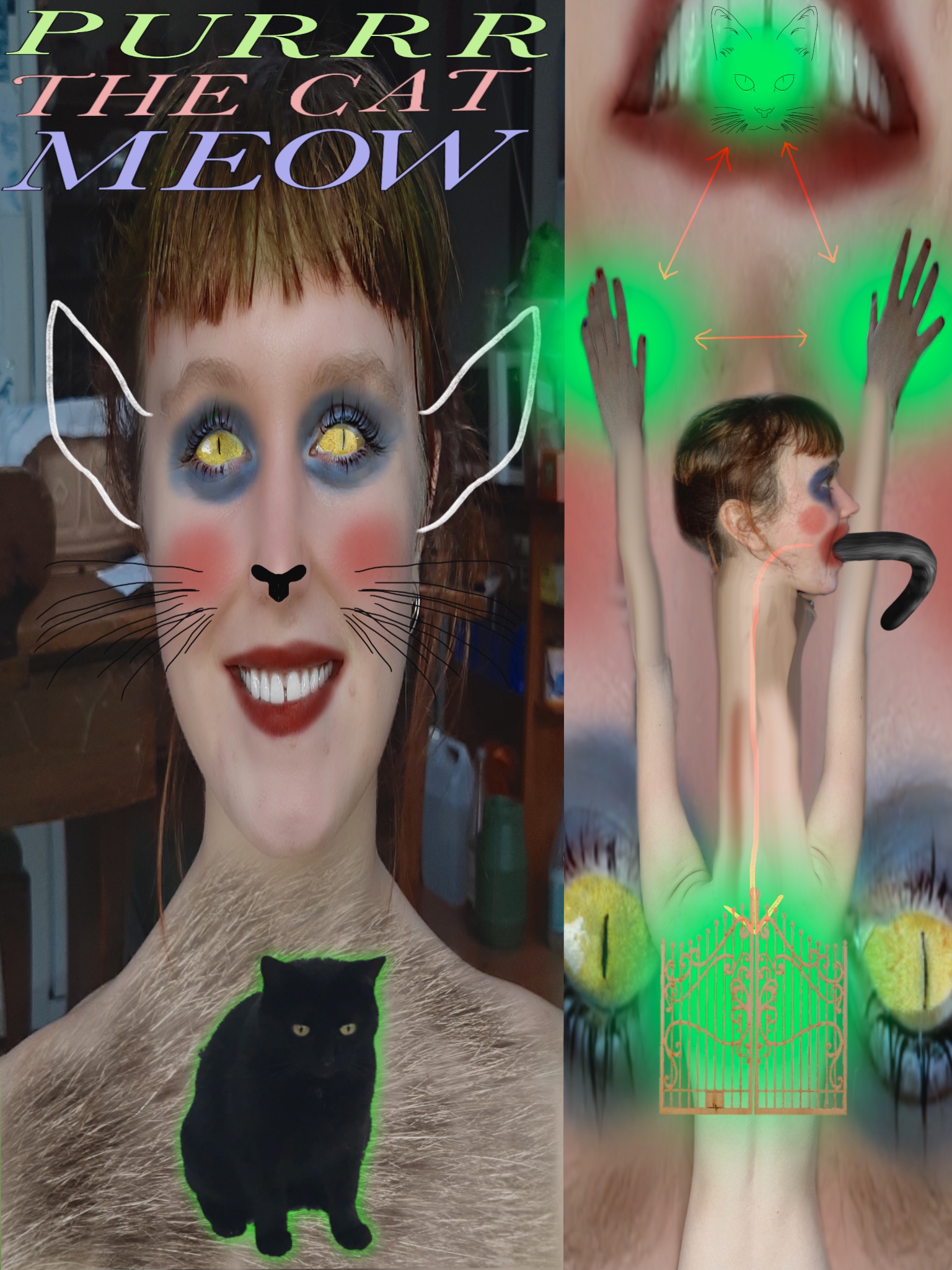Words by Stella Rousham.
Lockdown has been marked by intense feelings for everyone – grief, nostalgia, anxiety and importantly, loneliness. Under strict orders to ‘Stay Home’, to social distance and observe the 2 metre rule, we are confined to our carefully demarcated houses, bodies and rooms. As our lives and selves are increasingly contingent on the virtual — be that for work, pleasure or rest — intimacy under lockdown has taken on new formations.
It is these contradictions of intimacy, loneliness and fantasy which are at the heart of Leah Marojevic’s latest work 1-800-LONGING4IT created in collaboration with and commissioned by Mass Hysteria Collective. Originally intended to be an in-person, live performance in the form of a ‘Peep Show’, tighter government COVID-19 restrictions motivated the collaborators to take their work into the virtual. This was not the first time Leah has ventured into the hazy interface of digital performance. Having choreographed the virtual piece, GOING GHOST, for graduating students at The Place in summer 2020, Leah explains how this experience gave her the confidence to work in an online environment.
1-800-LONGING4IT premiered as part of the Present Futures Digital festival on Saturday 6th February 2021, taking the format of an ‘interactive phone call performance’. I caught up with Leah just before the festival, as she reflected on what the piece means to her, the creative process and where she sees the future of dance performance in the context of increasing ‘disembodied intimacies’.
SR: Your recent work with Mass Hysteria takes the format of a phone hotline. Based on images and text on a website, you book a late-night performance/conversation with one of the 12 performers from the dance collective, Mass Hysteria, and they host an intimate, one-on-one, phone call.
LM: Yes totally you’ve hit the nail on the head. Essentially this work came out of my experiences with loneliness, and longing to be kept company and having a chance to momentarily forget reality. COVID has underlined this sensation by denying contact or chance encounter with others. I think with or without COVID, intimacy with our own bodies and between bodies is a choreographic interest of mine – especially marginalised, queer intimacies. When the first lockdown hit Europe almost a year ago, I found it amusing and poetic when PornHub decided to give out a free subscription to all adults in Italy. To me, this gesture acted as a precursor for what was to come, as well as a reflection of how deep we are swimming in the age of disembodied, virtual intimacy.
SR: My first thought when researching 1-800-LONGING4IT was how phones have such a bad reputation in theatres and performances. Phones are always seen as a distraction and have to be on silent. I think it’s interesting how technology was seen as a distraction to performance and now it is becoming part of the performance, part of dance and to some extent, part of the dancers.
LM: That’s an interesting point. I wrote a description for one performance titled ‘The Theatre of Love; an Opera in Three Acts’. In the poem that was used to describe and advertise this show, there’s a line that says: ‘PLEASE TURN YOUR MOBILE PHONES ON TO BEHOLD THIS SHOW FROM THE BOX SEATS ABOVE.’ Whereas, normally in an opera house, it’s always ‘Please turn your phones off’. I guess people will have to wait to experience the works, but there are many different ways that the performers use the phone – where they have it positioned on the body or where to situate the phone in relation to the listener. I’ve been so inspired by everybody’s artistry and imagination in how they have decided to integrate the phone into their works.
In rehearsals, we’ve been talking a lot about the voice and how it can be manipulated to evoke certain atmospheres and environments for the caller. We started making this piece in November, and I invited my dear friend Sindri Runudde, who creates sound work and performances which explore audio sensualities and embodied listening, to lead a session with us. For their last work, Sindri researched how to ‘audify the gay world’ as a ‘crip-political’ statement. Sindri, who has a visual impairment, embodied an artistic practice that employed voice notes and phone calls when meeting new people online / on apps. In their experience, these formats of communication and flirtation develop intimacy at a much faster rate than pictures or texting, and brings more sound into these often anonymous, silent spaces which are otherwise very visual and text heavy.


I think that’s why this hotline piece emerged. As my friend said today, phone calls are becoming more and more retro, which is why I choose an early 2000s aesthetic for the piece. There are so many, almost too many ways, that we now communicate – via Zoom or with cameras or voice notes. So, I thought let’s bring it back. That’s what dance continues to do – returns you back to the body – it’s as ancient as it gets in terms of technology; our physical technology.
SR: This piece has such great scope for experimentation. Do you think online and virtual performance is something permanent? Is this something we will leave in the pandemic or will it have lasting effects on dance?
LM: I’ve been really excited by the strong conceptual drives of various online works. If I think of my work with Mass Hysteria or The Place, the ideas in these works would not have necessarily come about in a theatre or a live work setting. When working with students at The Place, I was so touched by the intimacy of the material we were developing; material that I don’t believe I would have discovered in a studio context
The transition of the Mass Hysteria piece to a virtual format made me reflect on how audiences consume bodies in live performance. I was really excited about the possibility to move away from screen and image-based performance work, and therefore activate an imaginary experience for both performer and audience. I worked with my friend, visual and performance artist — James St Findlay — to develop 12 adverts for the 12 dancers. We collaborated with the dancers from Mass Hysteria to decide how they want to be seen, because this will be the only clue for the audience of how to imagine them on the phone. By employing a hotline format, this work inherently celebrates and embraces a space for fantasy, intimacy, care, comfort and escapism. This work adopts this format to make a space to experience connection to others and ourselves through the lens of fantasy and play. In this format, the performers have the power to decide how they would like to be seen or to be imagined on these calls.
We talked a lot in this process about how saturated we are by images through the screen and how these images can be really impersonal, almost like a lie. The imagery used in 1-800-LONGING4IT really are performances in themselves. They are wildly fantastical representations of different ideas of people. To some extent, whether that be on Facebook, Instagram or dating apps, we are regularly performing through images of ourselves.
Within the context of 1-800-LONGING4IT, the audience purchases a show through a visual fiction, and what they get on the phone is this very personalised offer or generous gift. There’s an interesting edge to rub here; to fight for the analogue within the virtual.
Now that the website is launched and people are starting to buy tickets, it’s interesting to think about how the audience meets the performance through different layers: the title of the work as one layer, then the website as another, then the image of the performers is another thing, finally ending with the performer’s voice. I think that’s something I would like to continue to carry with me; the journey audiences take to reach a work already being the work.
SR: On social media people really do represent a fantasy, even if they’ve had a really bad day they will post a picture that contradicts that. Truth and fantasy become so blurred on social media and in the visual.
LM: Yeah totally, that’s why I was so interested in subverting what a group of female-identifying performers represent, taking images of women that are used for capital, and bringing them deep into the weird, the glamorous, the gross, etc. At home, under lockdown, I feel like I’m fermenting a little bit, like I stink, my teeth are not brushed yet and it’s 6pm. That to me is one reality. I was interested in where we can push images of ourselves in order to experience momentary relief from our own, sometimes kinda grim, realities.
I also had my friend Jade (JADEYA), a musician based in London come in to talk with us within our creative process. We talked specifically about personas or alter-egos that we carry with us to support who we are and the work that we do. Jade – a transwoman who also works within the sex worker industry – had some immensely poignant things to say about where alternative personas begin and end, how these alter-egos support us, and the importance of your own sense of self and environment that you’re in when you’re working without being seen… the candles, the bath, the perfume… the full fantasy, are felt if not smelt!
Performance for me is a space that allows you to transcend the limits of who you are in the world. Therefore, performance — live performance and bodies — can, through fantasy, enable the embodiment of other forms other than a human being. I am interested in the power that comes with different transformations. Maybe it’s a power that I don’t always feel in the real world. Maybe because in performance the body can disappear or transform or become and do almost anything.
SR: I think that’s really interesting the idea that a performance is a form of escapism as much for the performers as it is for the audience. Performing perhaps is way of escaping a particular form of their themselves and performing another self that’s not accessible at all times or requires an alternative space.
LM: That’s always the dream for me. That the performers, by embodying a state of being elsewhere, also invites the audience to occupy a space that transports them elsewhere too.
SR: Where do you see this piece going in the future — will you take it back to the analogue?
LM: In terms of the future it’s unknown, but we are ready to tour the world! For this festival, it made sense that the hotlines open for an hour and half – so 48 performances in total across all the performers. However, there are many ways that this work can evolve. I’m excited for the other ways this work might exist in the future and I think Mass Hysteria are also interested to know how it might continue. I would be interested to explore a hybrid between the phone call format and a live show at some point… there’s something so special to me that this work can be accessed by anyone in the world who has a phone number. Mass Hysteria and I haven’t all met in person yet, so I look very forward to when we all meet one day.
The premiere for 1-800-LONGING4IT as part of Present Futures Festival has now finished. You can still access the 1-800-LONGING4IT website, as well as keeping up to date with Leah’s and Mass Hysteria’s upcoming work using the links below:
